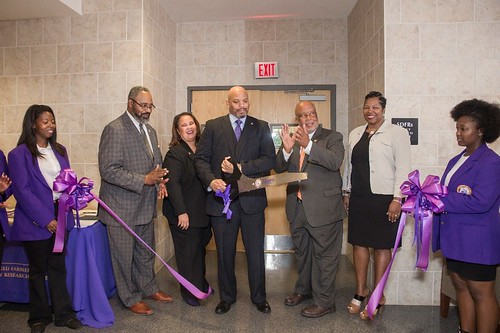
Day in, day out, the Department of Agriculture (USDA) brings programs to many farmers and ranchers as well as opportunities to students. As I meet with farmers, ranchers and USDA interns, a sense of great appreciation and anticipation wells up for the future of agriculture. One of the USDA offices that serves these farmers and students is the Office of Advocacy and Outreach (OAO). OAO staff connect with farmers, community organizers, veterans, educators and students to bring opportunities and services.
OAO works with community-based organizations to ensure access to USDA programs and services for underserved and limited-resource communities and farmers. A major program is the Outreach and Assistance for Socially Disadvantaged and Veteran Farmers and Ranchers Program (also known as the 2501 Program). Forty-five projects from organizations representing 25 States were awarded $8.8 million in 2016. This included a second year of $400,000 for the Socially Disadvantaged Farmers and Ranchers Policy Research Center at Alcorn State University.
Among the 2501 program grantees are Robert Gates and Clay Taylor, President and Agribusiness Specialist at the Tri-County Agricultural Cooperative (Tri-County Co-op) in Mississippi. The co-op serves approximately 45 small, socially disadvantaged farmers and ranchers – 80 percent of whom are under the age of 40. “Thanks to the 2501 program, we are able to do one-on-one work with farmers,” said Gates. “We can spend quality time doing the research they need and training them on marketing practices.” Taylor added, “The 2501 program allows rural individuals to turn family-owned property and rural towns into economic spaces and income generators. In the south we have a lot of space that is underused in terms of agriculture, especially sustainable agriculture. This program helps small, beginning, and socially disadvantaged farmers to unlock the hidden potential of agriculture.”
In September 2016, OAO organized the second annual 2501 Program Partnership Symposium. I spoke to the group along with officials from Farm Service Agency, Rural Development and Natural Resources Conservation Service emphasizing the importance of leveraging USDA programs to strengthen outreach and services. Among the 300 participants in two years was Robert Gates of Tri-County Co-op who reports that both meetings where great opportunities to network with other 2501 grantees and university and community partners.

OAO manages two critical advisory committees to the Secretary -- the Minority Farmers Advisory Committee and the Beginning Farmers and Ranchers Advisory Committee. Both committees provide recommendations to enhance USDA programs.
This year, OAO coordinated the 1890 USDA/Task Force meeting attended by a record number of 1890 Presidents, Agriculture Deans, and Research Directors. Among the objectives was to continue work on the Centers of Excellence which promote and expand USDA’s partnership with the 1890 Land-Grant Universities. USDA agencies have provided $1.6 million to the Centers. OAO also ensures that the 1890 National Scholars Program places top students across USDA. If you are a student or know of any students who would like to apply for the 1890 National Scholars Program, please download the application and submit it to USDA by the December 31, 2016 deadline.
USDA also partners with the Thurgood Marshall College Fund (TMCF) to provide internships and this year, USDA increased the number to 117 TMCF interns. I am fortunate to have TMCF interns working in my office and one of those is Jay Coleman, a graduate of Southern University Law Center, Baton Rouge, LA. “Interning at the USDA has been eye-opening, and has allowed me to put my Juris Doctor to use,” Coleman said. “I have been given the opportunity to use skills obtained in law school to assist in implementing technological advances in the Office of the Assistant Secretary.”
In FY 2016, USDA hosted 222 Hispanic Association of Colleges and Universities interns and set a record. The E. Kika De La Garza Fellowship Program offers faculty and staff from Hispanic Serving Institutions the opportunity to work with USDA to gain an understanding of the Federal government. In 2016, 12 Fellows participated representing four States and 12 universities. OAO staff also leads the USDA 1994 Tribal Land-Grant Colleges and Universities Program serving the 1994 Tribal Colleges which includes 34 tribal land-grant institutions.
With these OAO services in 2016 as well as over the past several years, USDA made great strides in addressing barriers faced by minority and socially disadvantaged farmers and ranchers. To further strengthen and elevate this engagement with historically underrepresented communities, OAO now will report directly to the Office of the Secretary. The realignment highlights the critical importance of OAO’s mission and function, and also demonstrates USDA’s commitment to maintaining the momentum in addressing long-standing challenges. This action also will create transparent lines of accountability and authority, and better facilitate oversight and coordination throughout USDA. The Department will continue to strengthen its outreach to customers on programs and services that support agricultural interests and rural communities -- the future of agriculture depends on it.
